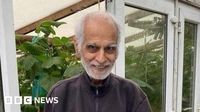Bhim Kohli, an 80-year-old grandfather, was walking his dog in Franklin Park, Braunstone Town, Leicestershire, on September 1, 2024, when his life was tragically cut short. What began as a routine stroll ended in a brutal attack: Kohli was punched, kicked, slapped with a shoe, and subjected to a torrent of racial abuse. He died the following day, leaving his family and community grappling with grief—and searching for answers.
In the months since the attack, Kohli’s daughter, Susan Kohli, has emerged as a determined advocate for justice. She’s not only mourning her father’s loss but also demanding accountability from Leicestershire Police, whom she accuses of failing to act on critical information that might have prevented her father’s death. According to the BBC, Susan Kohli believes that police "sat on information" about a similar assault in the same park just two weeks earlier, a delay she says could have made all the difference.
The earlier incident, which occurred on August 17, 2024, involved another Asian man being racially abused and assaulted by two white boys, aged 12 and 13, near Franklin Park—just yards from Kohli’s home. The boys reportedly hurled rocks, spat at the victim, shouted racial slurs, and taunted him to "go back to your village." Susan Kohli, her father, and other bystanders intervened, and the police were called. Kohli even gave a statement to officers, recounting what he had witnessed.
Despite identifying the perpetrators within days, police did not arrest the boys until September 5, three days after Bhim Kohli’s fatal assault. As reported by both BBC and LBC, Susan Kohli has questioned this delay, arguing that timely action could have sent a strong message to local youths and possibly deterred further violence. "You [the police] sat on it for over two weeks and didn't do anything—it could have sent a message around to the estate," she told the BBC. "When you have either police presence or you take action or have firm words with children that are from the estate, from the same school, word gets around. Word would have got around to say, 'you know what? We might need to be cautious about being around this area.'"
The attack that claimed Bhim Kohli’s life was both shocking and calculated. According to court proceedings detailed by the BBC, the assault lasted for a harrowing seven and a half minutes. The main aggressor was a 14-year-old boy, while a 12-year-old girl filmed the attack, laughing as she did so. Both were convicted of manslaughter: the boy was sentenced to seven years in custody, and the girl received a three-year youth rehabilitation order along with a six-month curfew.
During the trial, evidence emerged that the convicted girl had previously filmed other incidents of racial abuse in the park, including children throwing water balloons and apples at Asian men. The BBC also reported that Bhim Kohli himself had faced repeated harassment in the months leading up to his death. In July 2024, he was reportedly spat at, had stones thrown at him, and was racially abused after telling children to get off a neighbor’s garage roof.
After Kohli’s death, Leicestershire Police launched an internal investigation, which was subsequently reviewed by the Independent Office for Police Conduct (IOPC). The findings, as reported by both BBC and LBC, concluded that there was no misconduct or missed opportunity that could have prevented the tragedy. However, the report did identify "organisational learning"—specifically, the need for better logging and tagging of anti-social behavior incidents. A spokesperson for the IOPC said, "We agreed with their finding that police officers did proactively investigate matters reported to them and there was nothing to indicate any officers or police staff committed a criminal offence or behaved in a manner justifying disciplinary proceedings. And we agreed with learning identified by the force in respect of accurately recording and tagging incidents of anti-social behaviour, thus ensuring incidents can be dealt with appropriately and to support the long-term management and deterrence of ASB."
For Susan Kohli, these findings offer little comfort. She remains adamant that the delays in police action played a role in her father’s death. "It comes down to the delays... to take the required action," she told the BBC. "I think my dad would still be here. There's a possibility that my dad would still be here and that's what makes me angry. Your report is constantly saying there was nothing that Leicestershire Police could have done. There's a lot that they could have done, but they chose unfortunately not to. Leicestershire Police need to hold some accountability."
The internal report, which has not been made public, highlighted that a Police Community Support Officer (PCSO) had identified the boys involved in the August 17 assault just four days after the incident, thanks to footage uploaded to the police system. The subsequent delay in arrests was attributed to the officer in charge being on rest days, early and night shifts, and a bank holiday weekend—a period when, according to an email seen by Susan Kohli, "demand on policing would have been high." The force told her it believed the decisions made were "appropriate."
Since the tragedy, Leicestershire Police have stepped up their efforts in the Franklin Park area. Chief Superintendent Jonathan Starbuck told both the BBC and LBC that the force has increased community engagement through local surveys, drop-in centers, school outreach, youth work, and proactive patrols. "We continue to monitor the area of Franklin Park and have engaged with the community through a local survey, drop-in centres, engagement with local schools, youth work and proactive policing patrols," he said.
The case has also prompted wider reflection on the handling of youth offenders and the criminal justice system’s approach to racially motivated crime. The two boys involved in the August 17 assault, who were not implicated in Kohli’s death, appeared in youth court in December and admitted to racially or religiously aggravated common assault. They were dealt with out of court via a deferred youth caution and referral to the youth justice panel—a process designed to divert young people away from the criminal justice system when possible.
Meanwhile, the sentence given to the boy convicted of Bhim Kohli’s manslaughter is set to be reviewed. The Attorney General’s Office has referred the case under the Unduly Lenient Sentence scheme, with a hearing scheduled at the Court of Appeal. This has added another layer of scrutiny to a case that has already generated significant public debate about race, policing, and accountability.
As the community continues to heal, the legacy of Bhim Kohli’s life—and the painful circumstances of his death—remain a stark reminder of the consequences of delayed action and the ongoing struggle against racially motivated violence. For his family, the search for justice is far from over.


